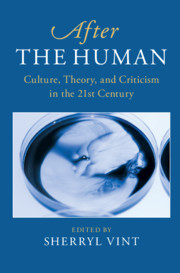Book contents
- After the Human
- After Series
- After the Human
- Copyright page
- Contents
- Contributors
- Acknowledgments
- Introduction
- Part I After Humanism
- Chapter 1 Historicizing Posthumanism
- Chapter 2 Poststructuralism and the End(s) of Humanism
- Chapter 3 Postmodernism
- Chapter 4 Embodiment and Affect
- Chapter 5 Requiem for a Digital Humanist
- Part II New Objects of Enquiry
- Part III Posthumanities
- Collective Works Cited
- Index
Chapter 2 - Poststructuralism and the End(s) of Humanism
from Part I - After Humanism
Published online by Cambridge University Press: 26 November 2020
- After the Human
- After Series
- After the Human
- Copyright page
- Contents
- Contributors
- Acknowledgments
- Introduction
- Part I After Humanism
- Chapter 1 Historicizing Posthumanism
- Chapter 2 Poststructuralism and the End(s) of Humanism
- Chapter 3 Postmodernism
- Chapter 4 Embodiment and Affect
- Chapter 5 Requiem for a Digital Humanist
- Part II New Objects of Enquiry
- Part III Posthumanities
- Collective Works Cited
- Index
Summary
Poststructuralism is one of the most important theoretical precursors of contemporary posthumanism. There is, for example, a close affinity between the poststructuralist topos of the “end of man” (Foucault, Derrida) and current posthumanist or postanthropocentric thinking about a time “after the human”. The “afterness” or belatedness that characterizes all post-isms creates a critical space for rethinking the human, or for thinking the human otherwise. In this sense, what poststructuralism reminds posthumanism of is the continued need for theorizing. The practice of (poststructuralist) theorizing thus survives in the work of many thinkers that have been instrumental in the development of a critical posthumanism (Haraway, Hayles, Braidotti, Butler, Agamben, Stiegler, Colebrook, Barad, Kirby, Esposito, Wolfe etc.). What poststructuralism brings to current thinking “after the human” is a critical instinct that understands the posthuman and the nonhuman as an otherness that continues to haunt any notion of human identity.
Keywords
- Type
- Chapter
- Information
- After the HumanCulture, Theory and Criticism in the 21st Century, pp. 31 - 43Publisher: Cambridge University PressPrint publication year: 2020
- 1
- Cited by

